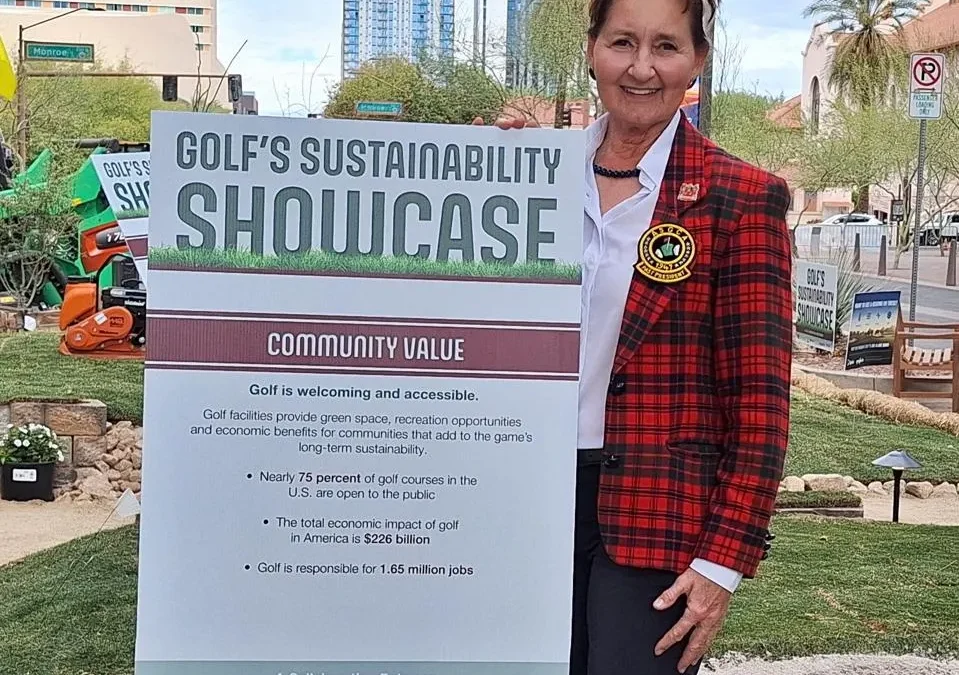A visit to the GCSAA Conference and Trade Show illustrated to “Forbes” writer Candace Oehler the industry-wide commitment to caring for natural resources Also highlighted was efforts “to supporting diversity, equity and inclusion initiatives,” headed by profiling ASGCA Past President Jan Bel Jan.
From “Forbes” magazine:
The weeklong Golf Course Superintendents Association of America (GCSAA) conference, “Rise to Shine,” was as much about science as soil. An estimated 11,000 self-described “turf nerds” descended on Phoenix, AZ, where they binged on a smorgasbord of seminars, panels, immersive field trips to area golf courses and exposure to cutting edge technology. They also braved sensory overload meandering through the sold-out exhibit halls that featured more than 450 trade show vendors.
Seminar subjects seemed to be in a foreign language. Hot topics included Cutline is King; Cracking the Code of Wetting Agents; Fantastic Nematodes and How to Kill Them; Demystifying Plant Function for Superior Results; Topdressing 101; and Managing Biotic and Abiotic Stresses.
It’s rocket science to a mere layperson. However, turf pros, architects and builders are acutely aware of how everything above, under and around the golf course –all the environmental and man-made elements – needs to be in harmonic balance. The golfing public sees the end result, with no idea of the massive amount of research and development that takes place before the first tee is placed into the ground.
The Need for Seed
According to the GCSAA, golf is a $102 billion a year industry. And, as J. Rhett Evans, GCSAA CEO put it so succinctly, “Without turf, there’s no golf course, no golfers and no golf business.”
A common misconception is that golf courses waste water and green space. On the contrary, golf course superintendents and their industry colleagues are leaders of environmental stewardship. They are on the forefront of conservation, pioneering new drought- and disease-resistant grasses, efficient irrigation techniques, and high tech aids to achieve environmental sustainability.
Many of these innovations were on display at Golf’s Sustainability Showcase, a collaboration between the GCSAA, and its presenting partners the Golf Course Builders Association of America (GCBAA), United States Golf Association (USGA) and the American Society of Golf Course Architects (ASGCA). The interactive exhibits located outside the convention center featured tee boxes, fairway and greens with a variety of stations demonstrating different grasses, irrigation techniques, pond retention systems and other best practices.
Among the displays were high tech sensors that allow golf course agronomists to measure water, soil, salinity and light to help reduce water use and assist with disease prevention. Drones were showcased as an efficiency tool transmitting photos that can make water management easier. And, of course, soil chemistry and irrigation adjustments can now be controlled on a phone app with the touch of a button.
The goal is to optimize playing conditions through turfgrass science and achieve sustainability. This has become particularly important as more and more states suffer the environmental stress of drought.
First Green
The GCSAA is committed to environmental education through First Green, a K-12 STEM (science, technology, engineering and math) outreach program that uses golf courses as a live laboratory. Students participate in hands-on, outdoor activities and learn about wildlife habitat, soil science, environmental sustainability, mathematics and more.
A recent $1 million donation from retired TORO executive Mike Hoffman’s family fund has enabled the creation of a new STEAM Ahead initiative that will integrate arts to the current STEM curriculum.
Ladies Leading Turf
The GCSAA is also committed to supporting diversity, equity and inclusion initiatives. The Ladies Leading Turf panel featured three women who achieved success in traditionally male-dominated fields – firefighter, baseball field head groundskeeper and public works manager.
Another woman who cut a huge swath through the grass ceiling many years ago is golf course designer and architect Jan Bel Jan. The Pittsburgh native held a senior design, construction and management position with noted golf course architect Tom Fazio for over 20 years and worked on at least 30 courses before starting her own company.
In 1990, she became just the second woman elected into full membership to the American Society of Golf Course Architects (ASGCA), following Alice Dye, and served as the organization’s president during the 2019-2020 term.
She is a dynamic person who loves to evangelize about the benefits of green space, and how golf enhances, rather than detracts from, the environment.
One of her favorite design projects with Fazio was The Old Collier Golf Club in Naples, FL.
“It was the first course that used the new Seashore Paspalum turf type,” she explained. “And that was important because it could tolerate up to 36,000 parts per million salt. So we were able to grow a golf course using salt water right out of the ocean.”
She is excited about advances in turf management, explaining, “For example, there are many, many club governors and superintendents who are choosing to reduce the amount of irrigated maintained turf. And that doesn’t mean that they’re making it more difficult. What they’re doing is determining the areas where fewest people play, that could be returned to a native or naturalized area, which then means reduced mowing area, reduced irrigated area, reduced pesticides and fertilizers.”
She also cites electronic sensors, irrigation heads and systems, and pump station advances as critical industry developments.
“These are all the things that are not sexy, the things that are underground,” she said. “But these are the things you don’t see that really make the golf course survive.”
She went on to point out and praise the new TifTuf turf on display at the Sustainability Showcase, noting that it is not only drought-tolerant, but more tolerant of cold weather, requiring as much as 20% less water.
Amy’s Golf Hole
A special, invited CGSAA convention guest was 25-year old Amy Bockerstette, the competitive golfer with Down syndrome who became a fan favorite at the 2019 WM Phoenix Open Pro Am, playing with PGA TOUR pro Gary Woodland. After hitting a drive into a bunker at the famous par 3, 16th hole, she made an up and down par that drove the crowd wild. Her catch phrase, “I Got This,” is now the name of the disability advocacy foundation she and her parents manage.
Jan Bel Jan was thrilled to meet Amy, and proposed that they collaborate on designing or redesigning a golf hole.
“I want to see golf through her eyes and the easiest way is to ask her to help me design a golf hole,” said Jan. “And her favorite hole is a par 3, so that’s what we’re going to design.”
Jan plans to find an existing par three and then start the process of determining Amy’s preferences. Length, bunkers and placement, slope, green size and tee boxes will be among Amy’s decisions to consider.
This unique collaboration is the first of its kind and both Amy and Jan are excited about creating something memorable, playable and sustainable.
Hitting the Green
“Rise to Shine” certainly lived up to its message. The turf warriors left the conference ready to effectively meet the challenges facing their industry on the surface, in the air and underground.

